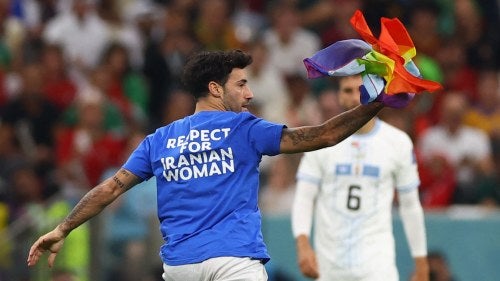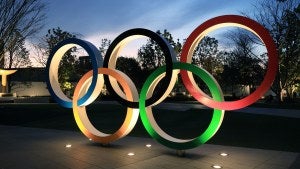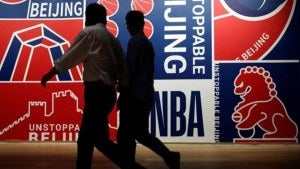Qatar 2022: China and Iran Confront the Political Power of the World Cup

The prestige and popularity of the World Cup is a political force beyond any nation's control, writes Chris Morris
With strict zero-COVID restrictions confining millions of people across China to their homes, the authorities may originally have thought of the World Cup as a blessing.
As unprecedented protests against the Chinese Communist Party’s zero-COVID policies spread to cities across the country, state TV has been editing out close-up pictures of maskless supporters at World Cup stadiums thousands of miles away in Qatar.
Using a time delay on the official feed, many pictures of fans without masks, celebrating in the stands, are being replaced by alternative camera angles of players or coaching staff. The implication is obvious: Beijing doesn’t want its people to see reminders that the rest of the world has moved on, and in sticking with its zero-COVID strategy, China is more or less alone.
But, of course, you can’t keep out every image. Since the World Cup began, Chinese social media has been awash with comments and videos which highlight the glaring difference between their daily lives and most of the rest of the world. Users weary of isolation have been asking whether China and the festival of football they can see on TV are on the same planet.
China didn’t even qualify for Qatar 2022. But when the most popular sport on the planet holds its most important international tournament to crown the champions of the world, we should not be too surprised that its political impact emerges in unexpected ways.
The People's Game
Football (soccer in North America, football pretty much everywhere else) is followed by billions of people with passionate intensity, and every four years the World Cup is its truly global moment.
For politicians, it holds an irresistible allure, because they love to bask in the reflected glory, and it can bring people together like little else. “Give them bread and circuses,” wrote the Roman poet Juvenal, “and they will never revolt.”
But football also holds dangers, because it provokes powerful emotions and can sway large crowds. The sport is far bigger than any one country. China’s authoritarian rulers are learning that lesson, and they may not be alone.
When Iran’s players did not sing their national anthem in their opening game against England, it was interpreted as a message of solidarity with the huge anti-government demonstrations that have engulfed Iran since the September death in police custody of 22-year-old Mahsa Amini, who was arrested for failing to wear her hijab head covering correctly. Hundreds of people are reported to have been killed in the most significant protests against the Islamic regime since the 1979 revolution.
The day before the game against England, Iran’s captain, Ehsan Hajsafi, had gone public with his support for his fellow Iranians.
“Before anything else,” he said, “I would like to express my condolences to all of the bereaved families in Iran. They should know that we are with them, we support them, and we sympathize with them.”
It was a brave statement from a sportsman walking a diplomatic tightrope. Among many people arrested in Iran in recent days, for voicing stronger support for the protesters, is Voria Ghafouri, a popular former national team player of Kurdish origin.
Before Iran’s second game against Wales, the singing of the anthem was back, with suggestions that huge pressure had been put on the players to conform. And this week, of course, Iran is playing the United States, the country demonized by the mullahs as the Great Satan. After their only previous World Cup meeting, in France in 1998, an estimated one million people took to the streets of Tehran to celebrate Iran’s 2-1 victory.
It is not quite war by other means, but it’s a very good substitute, and this time the atmosphere is slightly different. In the run-up to this week’s game, the United States Soccer Federation temporarily displayed Iran’s national flag on its social media channels without the emblem of the Islamic Republic. It was a message of solidarity with the protesters, and the federation said it was “to show support for the women in Iran fighting for basic human rights.”
Football and Identity
Football, in other words, can get to places that conventional diplomacy can’t always reach. It can also become a unifying factor in ways that normal politics can struggle to achieve.
Belgium, for example, is a country divided linguistically, politically, and culturally between its French and Flemish communities. But its national football team, the Red Devils, is one of the few symbols of genuine national unity.
Wales is another example of football’s unrivaled soft power. For a long time, Wales has been better known in the sporting world for its rugby union team. But the success of the Welsh football team, in reaching its first World Cup Finals since 1958, has galvanized a growing rebirth of national identity and bilingual pride in a country so often overshadowed by its noisy neighbors in England.
It seems appropriate therefore that Wales plays England at the same time as Iran faces the United States. Almost every game at any World Cup holds a subplot of one kind or another. That is part of the joy of the event itself, although if the much-maligned governing body of world football, the International Federation of Association Football (FIFA), had their way, no one would pay any attention to these off-field intrigues.
Insight and understanding delivered straight to your inbox
The world is always changing. Enter your email below to stay informed and engaged in the world's most critical issues through our weekly Global Insight newsletter.
The Qatar Question
FIFA have been their own worst enemies in the run-up to this World Cup. For a start, they decided to hold the tournament in Qatar, a tiny country with summer temperatures high enough to make running around a football field a life-threatening experience. To mitigate this risk, the tournament was moved to November and December, forcing an unpopular break in the middle of the European club football season. Qatar also had no stadiums appropriate for the event and had to build them all from scratch, prompting derision for FIFA’s claim that this is the first carbon-neutral World Cup.
There have also been well-documented controversies about allegations of corruption in the awarding of the tournament to Qatar; about the plight of the migrant workers who built the stadiums; and about the country’s human rights record more broadly.
And while FIFA President Gianni Infantino accused former colonial Western countries of hypocrisy, seven European countries who wanted their captains to wear One Love armbands during matches, in support of diversity and inclusion, were warned that they could face sanctions on the pitch if they were to go ahead.
Germany responded by taking a team photo with the players holding their hands in front of their mouths in protest at an act of censorship. And US Secretary of State Anthony Blinken, on a visit to Qatar, said it was “always concerning” to see any restrictions on freedom of expression.
At the heart of many of these debates are vast sums of money and the phenomenon known as sportswashing, as wealthy states with image problems seek to buy power and influence around the world.
Royal billionaires based in the Gulf have already bought their way into some of the most famous football clubs in Europe — the Emir of Qatar owns Paris Saint-Germain, Sheikh Mansour from Abu Dhabi owns Manchester City, and a Saudi consortium backed by Crown Prince Mohammad Bin Salman recently bought Newcastle United. The Saudi-sponsored breakaway golf tour, LIV Golf, shows these ambitions are not limited to football alone.
But the World Cup is the ultimate prize, and others want a slice of the action. Saudi Arabia is already involved in a bid to cohost the tournament in 2030. The controversies, and the clashes between competing cultural values, will continue over the coming weeks, and the coming years.
FIFA, and the Qatari authorities, had hoped in vain that they would simply disappear, and that countries would back away from political slogans of any kind and focus on playing the game. Nothing of the kind has happened, but this was already a World Cup in which international politics had played a role. Previous World Cup host Russia was banned from the tournament by sanctions imposed after its illegal invasion of Ukraine. So, where does the line get drawn?
As the tournament progresses, and the knock-out matches begin, events on the pitch should begin to take center stage. At the same time, this first winter World Cup will always be a reminder that sport and politics make awkward bedfellows.
But the power of football to make a political difference — both positive and negative — should never be underestimated.
One of the most famous names in British football — the legendary former manager of Liverpool Football Club, Bill Shankly — is often quoted, and sometimes misquoted, about the significance of football for the wider world.
“Someone said to me, ‘To you football is a matter of life or death!’” he told an interviewer. “And I said, ‘Listen, it’s more important than that.’”


Related Events

In the lead up to the Tokyo Olympic Games, athlete activists are taking action to promote the causes and issues they care about on the global stage.

Experts discuss how sports diplomacy can be an important soft power tool for nations to further cultural understanding and address geopolitical challenges.

A panel of experts examines how sports diplomacy can build gender and racial equity around the world.
